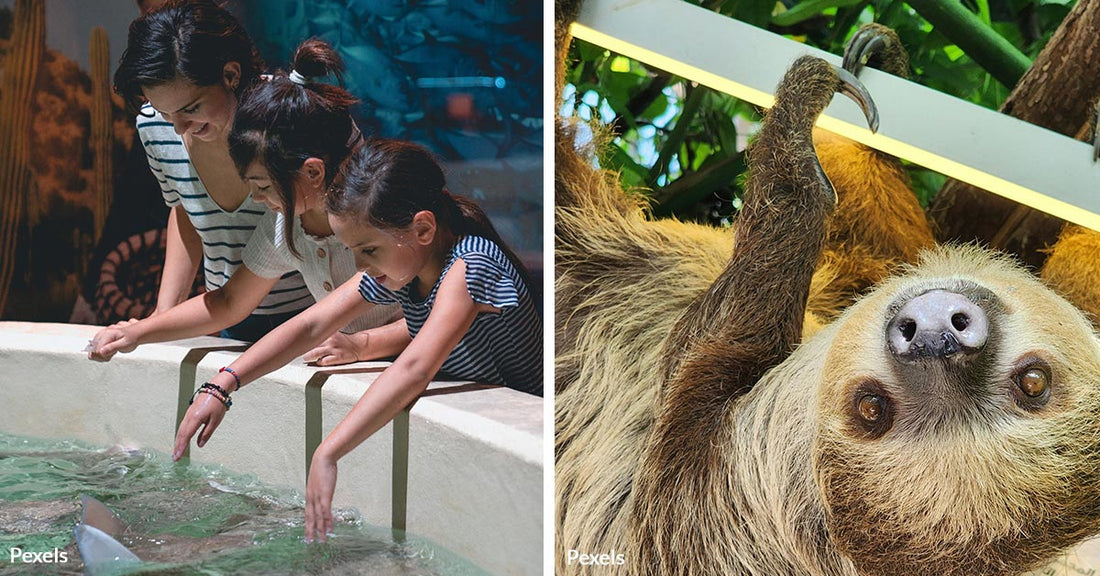Wildlife Pay the Price for Rising Cost of Entertainment at SeaQuest
Matthew Russell
Across the United States, SeaQuest facilities have become a topic of heated debate. These interactive aquariums, designed to offer up-close experiences with a variety of species, are facing scrutiny over the welfare of their captive animals.
In the darker side of wildlife tourism, the line between education and exploitation becomes blurred. Too often, innocent animals are paying the price.
 Photo: Pexels
Photo: PexelsThe USDA inspected SeaQuest Folsom, in California, and found it to be jeopardizing the health and welfare of sloths by failing to provide the correct temperature and humidity in their enclosures.
At various SeaQuest locations, a distressing range of species has suffered harm or death due to inadequate care and neglect. From sloths that perished after being kept in conditions with incorrect humidity and temperature, to stingrays found lifeless in touch tanks, the list of affected species is both heartbreaking and extensive.
Capybaras, otters, and even a sugar glider have faced dire situations, with some experiencing painful injuries or, tragically, not surviving, according to PETA. These incidents underscore the urgent need for improved oversight and care within these facilities to ensure the well-being and safety of all housed animals.
 Photo: Pexels
Photo: PexelsCapybaras, otters, and sugar gliders at SeaQuest have also faced dire circumstances, leading to injuries and, in some cases, death.
Voices of Dissent
Recent protests at SeaQuest's Folsom location highlight a growing concern over animal treatment within these establishments, ABC10 reports. Reports of multiple citations by the United States Department of Agriculture (USDA) against SeaQuest have fueled public outcry.
Concerns are not only about the living conditions of the animals but also about the ethical implications of using them for commercial purposes.
Critics argue that the commercial nature of SeaQuest's operations prioritizes profit over animal welfare. This concern is echoed by former employees and animal rights organizations, who question the ethicality of confining wild animals to mall environments, far from their natural habitats. According to an ABC investigation, the size and cleanliness of enclosures, along with a lack of natural elements such as fresh air and sunlight, have been points of contention.
 Photo: Pexels
Photo: PexelsAllegations against SeaQuest include neglect, inadequate care, and public safety risks.
A Pattern of Neglect
Investigations into SeaQuest have revealed a troubling pattern of neglect and inadequate care. From the improper maintenance of enclosures to insufficient veterinary care and questionable acquisition of animals, the issues are manifold.
Some animals, already stressed by constant human interaction, face further distress due to overcrowded and unnatural living conditions.
The impact of these practices extends beyond the animals to the public. Incidents of animals harming visitors have raised questions about the safety of such interactive experiences.
 Photo: Pexels
Photo: PexelsThe USDA has cited SeaQuest for multiple Animal Welfare Act violations.
Legislation and Oversight
The controversy surrounding SeaQuest has ignited a broader discussion on the need for stronger animal welfare laws and better enforcement of existing regulations.
The Animal Welfare Act, while a federal standard, is deemed insufficient by many advocates for truly safeguarding the well-being of animals in captivity.
The situation at SeaQuest facilities serves as a stark reminder of the complexities surrounding animal entertainment and tourism. As society grapples with these ethical dilemmas, the hope is for a future where animal welfare takes precedence, ensuring that entertainment does not come at the expense of those who cannot speak for themselves.
Click below and help us make a difference!

